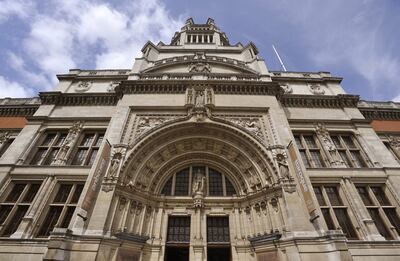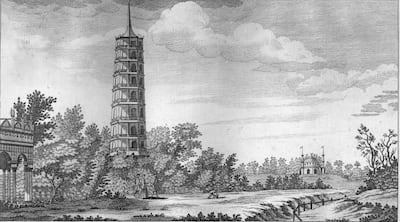The Victoria & Albert Museum in London has unveiled its first Ramadan Pavilion, an installation intended as a tribute to the religious observance.
It is an immersive experience for visitors seeking to learn about the customs and traditions associated with the holy month.
The V&A said the pavilion's design is reminiscent of a modern mosque, drawing inspiration from the museum's extensive collection of prints and drawings of historic Islamic architecture. It seeks to represent the history of British Muslims and their place in the country.
The idea behind the design was to reflect the way British mosques have been built by their communities, referencing various traditions of Islamic history through architectural symbols.
The installation will be at the V&A's Exhibition Road Courtyard until May 1.
The Ramadan Pavilion was designed by Shahed Saleem, an architect, writer and teacher at the University of Westminster School of Architecture.
Saleem, whose parents are from India, is the founder of architectural firm Makespace and the designer of mosques in Bethnal Green, Hackney and Aberdeen in Scotland. “I began working on my first mosques almost 20 years ago when I started to be approached through word of mouth by mosque communities to look at their buildings and aspirations," he said. "I have worked on many since then, at all stages, from adaptations and extensions to new-builds.”

Saleem's mosque on Hackney Road, for example, is an extension to an early 19th-century end-of-terrace house whose gable wall is inscribed with a Victorian advertisement for locks and safes.
The Pavilion will serve as a venue for a range of public events and two open iftars.
Its purpose is to honour the diverse experiences of Muslims in the UK and worldwide during this time of year, and to highlight the fundamental values and customs of Ramadan through creative expression, exploration and a dynamic public arts programme.
Christopher Turner, keeper of art, architecture, photography and design at the V&A, said: “Mosques in the UK are grass-roots, crowd-sourced, community projects that occupy improvised spaces and exemplify creative reuse. Saleem’s design for the inaugural Ramadan Pavilion explores these themes of immigration, hybridity and multiculturalism to create a welcoming space at the heart of the V&A that celebrates the contemporary Muslim experience in Britain.”
Omar Salha, founder and chief executive of the Ramadan Tent Project, said: “For the past decade, Ramadan Tent Project has connected and convened over half a million people from all backgrounds through its annual Ramadan Festival and flagship initiative Open Iftar. It is with great pride to mark our 10-year anniversary with the launch of the Ramadan Pavilion as the first of its kind, globally.
"The Ramadan Pavilion is designed to serve not only as a physical structure and installation which inspires visitors connected to Islamic arts and architecture, but also as a space for millions of visitors to engage, celebrate and learn about Islam, Ramadan, Muslim history, culture and heritage.”
The history of the Pavilion
The first mosque in Britain was constructed in the 18th century as a whimsical structure by William Chambers at Kew Gardens. The design was inspired by Turkish Islamic architecture and featured a pair of minarets. It was one of numerous temples and garden structures built during that era, with the Great Pagoda being the sole remaining structure today.

Saleem, an architect who wrote The British Mosque: An Architectural and Social History, published in 2018, has reimagined this structure in the vibrantly coloured Ramadan Pavilion.
The Ramadan Pavilion is part of this year's Ramadan Festival, an annual collection of artistic, cultural and creative events to inspire and engage audiences from all backgrounds. It also hosts the Open Iftar, the UK’s largest community event during the holy month.
The festival is organised by the Ramadan Tent Project, a charity founded in 2013 to promote community cohesion and deepen an understanding of the month.


